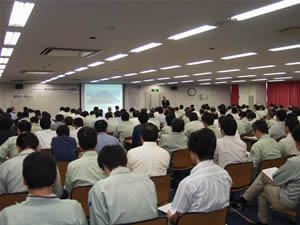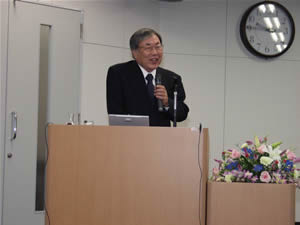
|
|
During the Safety Presentation
|
The presentation began with opening remarks from Hitachi GE Nuclear Energy president Mr. Masaharu Hanyu.
"Japan Nuclear Technology Institute is holding today's non-regularly scheduled Safety Caravan by special request in order to take up the question of the error in earthquake-proofing calculations at the reprocessing facility.
Today is the 12th of October. It was the 13th of October when guidance was handed down by the former Ministry of International Trade and Industry regarding the incident of falsification of records on heat treatment of welded joints in nuclear facility piping with the aim of preventing recurrence of such problems, and thus 13th October has been declared "Fundamentals and Integrity in Nuclear Energy Day" lest we might forget the incident. Furthermore, since the 2001 leakage of pool water incident at the reprocessing facility, all sorts of efforts have been made toward enhancing policies in the effort to foment corporate ethics and refresh compliance awareness, but in respect to the current seismic-resistance calculation error at the reprocessing facility, even though it has been more than ten years since the problem occurred, the fact that it has taken until this time before the word started getting out is unforgivable from the perspective of fomenting and permeating safety culture and transparency in the workplace.
"Hitachi GE Nuclear Energy, Ltd. was inaugurated on the 1st of July this year as the successor to the work being done by Hitachi, Ltd. Nuclear Division. The company has developed its business under the corporate philosophies of 'Harmony,' 'Integrity' and 'Pioneering Spirit,' but due to the present circumstances, we believe we must move forward with even greater strength by going back to the basic principles of "fundamentals and integrity" upon which Hitachi is founded, rethink daily work routines, implement compliance activities, and foster a climate of transparency in the workplace throughout all group companies.
"Today, Professor Inoue will present a lecture, and then share candid opinions in leading today's opinion exchange session, providing us with food for thought for hereafter."
After the opening salutation, Professor Shiichirou Inoue of the Kanto Gakuin University College of Human and Environmental Studies and Director of Research at The Institute for Science of Labour presented a lecture entitled "Human Factors and Safety Culture." |

|
|
Doctor of Engineering Hiroshi Kai
Director of Kai Safety Consulting Firm
|
It is well known fact that industrial accidents have decreased sharply over the most recent quarter of a century. However, at the present point in time, the downward curve has leveled off. As a result of carefully scrutinizing the root causes of the remaining accidents, the majority are attributable to human error. In other words, this can be seen as evidence that concrete countermeasures against accidents have yielded a certain amount of success, whereas countermeasures against human factors have yet to yield sufficient results.
So, then, let's give some thought to how countermeasures against human errors have transformed over time.
The position that "Human Error is the Cause of Accidents" is one that is firmly implanted in the minds of the upper management of any industrial organization, and this serves as an engraved-in-stone paradigm when drafting accident countermeasures.
As a result, the course of events shows that "enhancement of safety awareness by employees" and "re-instituting safety education" are always at the top of the list of countermeasures, but as I pointed out at the beginning of the lecture, the fact that these measures have not exhibited sufficient effectiveness in curbing accidents can by now be clearly seen by everyone.
Setting aside the commonly accepted status quo that "human error is the cause of human error theory" for the moment, the event that transformed the aetiology paradigm more than anything is believed to be the accident at the Chernobyl nuclear plant. The term "safety culture," which is incorporated into the IAEA report, has had an immeasurable effect upon bringing into our sights in today's culture the (scientifically backed) common knowledge that "human error is nothing more than an enabler for some sort of organizational factor." In other words, in the search for the cause, rather than to focus on individuals, they had the keen insight to realize that they should turn their sights toward the safety management system of the organizational entity concerned. It is desirable that the framework of thinking that "industrial accidents are organizational accidents" should be made a fundamental or principle that must not be forgotten when drafting such accident countermeasures.
And while all this may be so, when we take a look at the actual circumstances, accidents are covered up and corporate scandals occur, and it seems hardly ever a day goes by when we do not hear talk about establishing compliance and engineering ethics and the like. Perhaps this "safety culture" concept I just spoke about may have been successful in transforming the paradigm of thinking, but when it comes to the realm of practicing tangible daily safety activities, I don't think we have reached that stage yet. It goes without saying that "establishing a form of culture" in a short period of time is not feasible. If we calmly and objectively analyze the current situation, perhaps it would be more appropriate to say that we are now in the incubational stage.
I hope today's lecture will have provided all of you attending with some topics for deliberation and food for thought, based on the recognition of the circumstances, for seeking out the causes of human error from the past records of accidents, and how accidents are the manifestation of systematic and organizational conditions.
The above summarizes the valuable insights presented by Professor Inoue.
Comments from the questionnaires conducted after the presentation:
●The lecture was very easy to understand and interesting, and the time spent listening was well worth it. I felt that although I could understand it as a point of the lecture, actually putting these ideas into practice is a much more difficult problem, and unless society itself on the whole make endeavors in unison, solutions cannot be attained. I feel that efforts should stem from the morals of each individual person, and that I personally must improve myself and make efforts to eliminate human errors.
●Thank you very much for the exceedingly interesting lecture. From now on, instead of mere superficial safety measures and policies, I shall make my sincerest efforts to put into practice the activities that come to grips with deeply rooted core human characteristics.
●Recognizing that the human being is an animal prone to making mistakes, measures have got to be implemented, but taking into account the enormity of the nuclear power industry, effects on human society, and reactions by the mass media and the like, it reminds me once again that this is no easy task. I believe we must move forward one step at a time learning as we go.
●It was an exceptionally interesting lecture, and taking an abstract look at the overview of it all, I feel that I should consider my own workplace and what concrete actions should be implemented. I hope to be able to continue on a daily basis receiving information from completely different fields (of technology) and feel motivated by it, so as to expand my point of view and make effort to apply the information widely, and tie this in to new measures.
●It was worth every minute of the time spent, as we were told about new ways of looking at and thinking about human errors. Furthermore, safety measures from the perspective of engineering logic alone is useless, and it refreshed my awareness of the importance of sharing what can be shared within the organization.
These and other opinions and impressions were expressed in the questionnaires.
Afterward, Yasuro Suzuki, Executive Director of Japan Nuclear Technology Institute presented an overview of the activities of our organization. |







